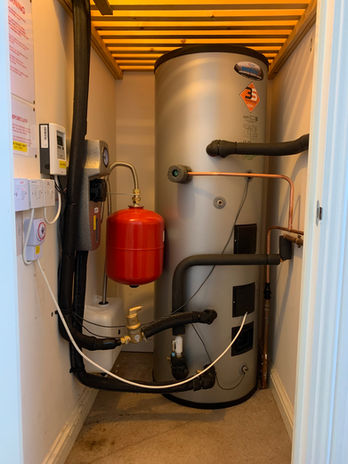Solar Thermal for Water Heating
Solar Hot Water


Solar hot water systems are designed to provide the hot water you use from your taps. They use energy from the sun to heat water for storage in a hot water cylinder or thermal store.

Benefits of Going Solar:
-
0% VAT – Homeowners can save hundreds on the cost of solar panels in 2024 thanks to the recent reduction in VAT.
-
Lower up-front costs – New technology and more competition have dramatically reduced the cost of solar panels, making them an affordable option.
-
Slash your electric bills – Sunlight is free, so once you’ve paid for the panels you can start reaping the rewards. The savings can be up to hundreds of pounds per year!
-
Reduce your carbon footprint – Solar energy is one of the most environmentally friendly options out there.
-
Increase EPC rating – Solar panels can significantly improve your property’s EPC rating.
Some of our previous installations...
How do solar thermal panels work?
Solar water heating systems are comprised of flat panels or tubes, called solar collectors, which gather solar energy by converting the infra-red portion of visible light into heat. They contain a mix of water and glycol to absorb the heat in the sun which is transferred to the hot water cylinder for storage.
Where can solar panels be installed?
Solar panels can be installed on many roof types (e.g. metal, slate, hipped, flat, rosemary tiles, clay pantile, concrete, trussed, metal framed) but can also be ground mounted on A frame structures.. The ideal position is South facing at 35 degrees angle of inclination while East or West facing roofs can still be used. North facing roofs are not recommended.
Who can have Solar thermal?
Solar thermal can be installed on domestic housing, commercial premises, swimming pools, anywhere a volume of hot water is required (i.e. sports clubs, sailing clubs, leisure centres, breweries, hotels, distilleries, dairy farms, campsite shower blocks. etc....). Note Solar thermal is not compatible with a combi boiler.
What savings can I expect?
The savings made will depend on the fuel currently being used with the biggest impact being a switch from electric immersion heaters.
Click here to arrange a free no obligation quotation.
Horisun Renewable Energy are MCS (Microgeneration Certification Scheme) approved installers who are also members of RECC (the Renewable Energy Consumer Code). Any deposits we take are held by IWA (Independent Warranty Association) so you can rest assured your renewable energy installation is in the safest of hands.















